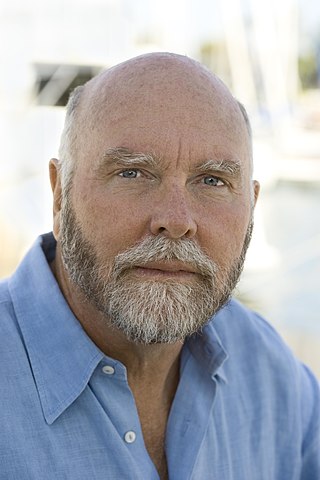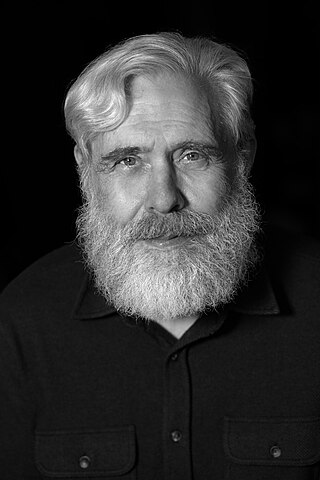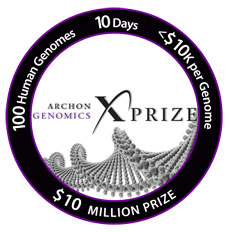Related Research Articles

John Craig Venter is an American biotechnologist and businessman. He is known for leading one of the first draft sequences of the human genome and assembled the first team to transfect a cell with a synthetic chromosome. Venter founded Celera Genomics, the Institute for Genomic Research (TIGR) and the J. Craig Venter Institute (JCVI). He was the co-founder of Human Longevity Inc. and Synthetic Genomics. He was listed on Time magazine's 2007 and 2008 Time 100 list of the most influential people in the world. In 2010, the British magazine New Statesman listed Craig Venter at 14th in the list of "The World's 50 Most Influential Figures 2010". In 2012, Venter was honored with Dan David Prize for his contribution to genome research. He was elected to the American Philosophical Society in 2013. He is a member of the USA Science and Engineering Festival's advisory board.

The J. Craig Venter Institute (JCVI) is a non-profit genomics research institute founded by J. Craig Venter, Ph.D. in October 2006. The institute was the result of consolidating four organizations: the Center for the Advancement of Genomics, The Institute for Genomic Research (TIGR), the Institute for Biological Energy Alternatives, and the J. Craig Venter Science Foundation Joint Technology Center. It has facilities in Rockville, Maryland and San Diego, California.

Human Genome Sciences (HGS) was a biopharmaceutical corporation founded in 1992 by Craig Venter, Alan Walton and Wally Steinberg. It uses the human DNA sequence to develop protein and antibody drugs. It had drugs under development to treat such diseases as hepatitis C, systemic lupus erythmatosis, anthrax, and cancer. It collaborated with other biotechnology and pharmaceutical companies for development partnerships and licensing.
deCODE genetics is a biopharmaceutical company based in Reykjavík, Iceland. The company was founded in 1996 by Kári Stefánsson with the aim of using population genetics studies to identify variations in the human genome associated with common diseases, and to apply these discoveries "to develop novel methods to identify, treat and prevent diseases."

Personalized medicine, also referred to as precision medicine, is a medical model that separates people into different groups—with medical decisions, practices, interventions and/or products being tailored to the individual patient based on their predicted response or risk of disease. The terms personalized medicine, precision medicine, stratified medicine and P4 medicine are used interchangeably to describe this concept, though some authors and organizations differentiate between these expressions based on particular nuances. P4 is short for "predictive, preventive, personalized and participatory".

George McDonald Church is an American geneticist, molecular engineer, chemist, serial entrepreneur, and pioneer in personal genomics and synthetic biology. He is the Robert Winthrop Professor of Genetics at Harvard Medical School, Professor of Health Sciences and Technology at Harvard University and Massachusetts Institute of Technology, and a founding member of the Wyss Institute for Biologically Inspired Engineering at Harvard University.

The Human Genome Project (HGP) was an international scientific research project with the goal of determining the base pairs that make up human DNA, and of identifying, mapping and sequencing all of the genes of the human genome from both a physical and a functional standpoint. It started in 1990 and was completed in 2003. It remains the world's largest collaborative biological project. Planning for the project started after it was adopted in 1984 by the US government, and it officially launched in 1990. It was declared complete on April 14, 2003, and included about 92% of the genome. Level "complete genome" was achieved in May 2021, with only 0.3% of the bases covered by potential issues. The final gapless assembly was finished in January 2022.

The Archon Genomics X PRIZE presented by Express Scripts for Genomics, the second X Prize offered by the X Prize Foundation, based in Playa Vista, California, was announced on October 4, 2006 stating that the prize of "$10 million will be awarded to the first team to rapidly, accurately and economically sequence 100 whole human genomes to an unprecedented level of accuracy." The 30 day evaluation phase of the competition to begin on September 5, 2013, was canceled August 22, 2013 and this cancellation was debated on March 27, 2014.
Charles Thomas Caskey, also known as C. Thomas Caskey, was an American internist who has been a medical Geneticist and biomedical researcher and entrepreneur. He was a Professor of Molecular and Human Genetics at Baylor College of Medicine, and served as editor of the Annual Review of Medicine from 2001 to 2019. He was a member of the editorial boards of the Proceedings of the National Academy of Sciences, Science, the Encyclopedia of Molecular Medicine and numerous other medical and scientific journals.
Personal genomics or consumer genetics is the branch of genomics concerned with the sequencing, analysis and interpretation of the genome of an individual. The genotyping stage employs different techniques, including single-nucleotide polymorphism (SNP) analysis chips, or partial or full genome sequencing. Once the genotypes are known, the individual's variations can be compared with the published literature to determine likelihood of trait expression, ancestry inference and disease risk.

Whole genome sequencing (WGS) is the process of determining the entirety, or nearly the entirety, of the DNA sequence of an organism's genome at a single time. This entails sequencing all of an organism's chromosomal DNA as well as DNA contained in the mitochondria and, for plants, in the chloroplast.
The exome is composed of all of the exons within the genome, the sequences which, when transcribed, remain within the mature RNA after introns are removed by RNA splicing. This includes untranslated regions of messenger RNA (mRNA), and coding regions. Exome sequencing has proven to be an efficient method of determining the genetic basis of more than two dozen Mendelian or single gene disorders.
Knome, Inc. was a human genome interpretation company based in Cambridge, Massachusetts. Launched in 2007, Knome focused on improving quality of life by applying insights gained from the interpretation of human genomes. They helped identify and classify the variants, genes, and gene sets that are likely to govern or underlie a specific disease, tumor, or drug response. Their clients included academic, pharmaceutical and medical researchers. In 2015, it was acquired by Tute Genomics.
Brandon Ross Colby is an American medical geneticist in Beverly Hills, California and physician specializing in predictive medicine and genetic testing. He is author of Outsmart Your Genes, a book about genetics published in 2011, and he is the founder and CEO of direct-to-consumer genetic testing service Sequencing.

The $1,000 genome refers to an era of predictive and personalized medicine during which the cost of fully sequencing an individual's genome (WGS) is roughly one thousand USD. It is also the title of a book by British science writer and founding editor of Nature Genetics, Kevin Davies. By late 2015, the cost to generate a high-quality "draft" whole human genome sequence was just below $1,500.

Eric Emil Schadt is an American mathematician and computational biologist. He is founder and former chief executive officer of Sema4, a patient-centered health intelligence company, and dean for precision medicine and Mount Sinai Professor in Predictive Health and Computational Biology at the Icahn School of Medicine at Mount Sinai. He was previously founding director of the Icahn Institute for Genomics and Multiscale Biology and chair of the Department of Genetics and Genomics Sciences at the Icahn School of Medicine at Mount Sinai.
Tute Genomics is a genomics startup that provides a cloud-based web application for rapid and accurate annotation of human genomic data. Built on the expertise of ANNOVAR, Tute assists researchers in identifying disease genes and biomarkers, and assists clinicians/labs in performing genetic diagnosis. Based in Provo, Utah, Tute was co-founded by Dr. Kai Wang, an Assistant Professor at the University of Southern California (USC); and Dr. Reid J. Robison, a board-certified psychiatrist with fellowship training in both neurodevelopmental genetics and bioinformatics.

The New York Genome Center (NYGC) is an independent 501(c)(3) nonprofit academic research institution in New York, New York. It serves as a multi-institutional collaborative hub focused on the advancement of genomic science and its application to drive novel biomedical discoveries. NYGC's areas of focus include the development of computational and experimental genomic methods and disease-focused research to better understand the genetic basis of cancer, neurodegenerative disease, and neuropsychiatric disease. In 2020, the NYGC also has directed its expertise to COVID-19 genomics research.
Elective genetic and genomic testing are DNA tests performed for an individual who does not have an indication for testing. An elective genetic test analyzes selected sites in the human genome while an elective genomic test analyzes the entire human genome. Some elective genetic and genomic tests require a physician to order the test to ensure that individuals understand the risks and benefits of testing as well as the results. Other DNA-based tests, such as a genealogical DNA test do not require a physician's order. Elective testing is generally not paid for by health insurance companies. With the advent of personalized medicine, also called precision medicine, an increasing number of individuals are undertaking elective genetic and genomic testing.
Sophia Genetics SA is a data-driven medicine software company with headquarters in Lausanne, Switzerland and Boston, Massachusetts. It provides genomic and radiomic analysis for hospitals, laboratories, and biopharma institutions. The company was ranked among the 50 smartest companies by the MIT Technology Review in 2017. The company went public on the Nasdaq in 2021, floating at $1.1B.
References
- ↑ "'Supercharged' genomics: 100 years of breakthroughs possible in 10 years (Wired UK)". Wired.co.uk. Retrieved July 8, 2015.
- ↑ "Human Longevity, Inc. Completes $220 Million Series B Financing – Human Longevity, Inc". www.humanlongevity.com. Archived from the original on 2018-03-25. Retrieved 2016-08-17.
- ↑ "Adding ages". The Economist. ISSN 0013-0613 . Retrieved 2016-08-17.
- ↑ Ferris, Robert (2016-07-19). "Biotech says longer life is in your DNA". CNBC. Retrieved 2016-08-17.
- ↑ Taylor, Nick Paul (May 30, 2018). "Venter to leave Human Longevity as turnover at the top continues". FierceBiotech.
- ↑ "Genomics Company Human Longevity Sues J. Craig Venter Institute". The Scientist Magazine®.
- ↑ "Human Longevity Suit Against JCVI Dismissed". GenomeWeb. 20 December 2018.
- ↑ "Human Longevity Closes $30 Million Financing From Emerging Technology Partners and Other Leading Healthcare Investors to Renew Its Commitment to Longevity and Precision Health". BioSpace. November 6, 2019. Retrieved 2024-05-14.
- ↑ "World Expert in Genetics Joins Human Longevity as Chief Medical Officer". Business Wire. 13 November 2019.
- ↑ Hou, Ying-Chen Claire; Yu, Hung-Chun; Martin, Rick; Cirulli, Elizabeth T.; Schenker-Ahmed, Natalie M.; Hicks, Michael; Cohen, Isaac V.; Jönsson, Thomas J.; Heister, Robyn; Napier, Lori; Swisher, Christine Leon (2020-02-11). "Precision medicine integrating whole-genome sequencing, comprehensive metabolomics, and advanced imaging". Proceedings of the National Academy of Sciences. 117 (6): 3053–3062. Bibcode:2020PNAS..117.3053H. doi: 10.1073/pnas.1909378117 . ISSN 0027-8424. PMC 7022190 . PMID 31980526.
- ↑ Levin, Michael (2023-01-12). "How to Live to 100 With Great Quality of Life". Worth. Worth. Retrieved 2024-01-05.
- ↑ Leo, Leroy (20 June 2022). "Human Longevity plans to go public in $1 bln blank-check deal". Reuters. Retrieved 6 January 2024.